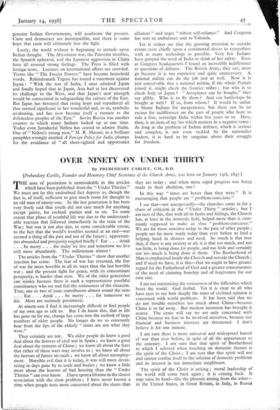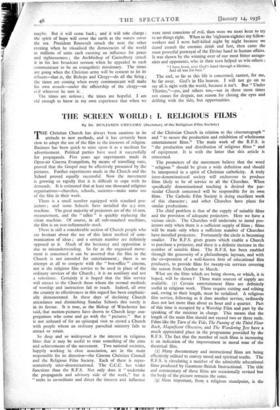OVER NINETY ON UNDER THIRTY
By PREBENDARY CARLILE, C.H., D.D.
[Prebendary Carlik, Founder and Honorary Chief Secretary of the Church Army, was born on January 14th, 1847.] THE note of pessimism is unmistakable in the articles which have been published from the " Under Thirties." We must not let this undoubted fact depress us, though the fact is, of itself, sufficient to give much room for thought to an old man of ninety-one. In the last generation it has been very freely said that youth did not care much for anything except gaiety, for cocktail parties and so on. To some extent that phase of youthful life was due to the understand- able reaction that followed immediately in the train of the War; but was it not also due, to some considerable extent, to the fact that the world's troubles seemed at an end—war seemed a thing of the past and not of the future; opportuni- ties abounded and prosperity reigried briefly ?. Eat . . . drink . . . be merry . . . for today'vie live and tomorrow we live still more abundantly. The millennium almost !
The articles from the " Under Thirties " show that another reaction has come. The fear of war has returned, the fear of war far more horrible in all its ways than the last horrible war ; and the present fight for peace, with its concomitant prosperity, is harder than ever. We of the older generation can rejoice because there is such a representative youthful constituency who see and feel the seriousness of the situation. True, one or two of your contributors almost sound the note . . . Eat . . . drink . . . be merry . . . for tomorrow we die. Most are seriously pessimistic.
At ninety-one I find it increasingly difficult to find people of my own age to talk to. But I do know this, that as life has gone on for me, change has come into the outlook of large numbers of older people. No longer do we so constantly hear from the lips of the elderly " times are not what they were."
They certainly are not. We older people do know a good deal about the horrors of civil war in Spain ; we know a good deal about the tortures of China ; we know all about the fears that either of these wars may involve us ; we know all about the horrors of future air-raids ; we know all about unemploy- ment. Horrible evil that it is today, it was still more devas- tating in days gone by to souls and bodies ; we know a little more about the horrors of bad housing than the " Under Thirties " can ever know. I have spent a lifetime in the closest association with the slum problem ; I have never known a time when people were more concerned about the slums than they are today ; and when more rapid progress was being made in their abolition, too !
In this way " times are better than they were." It is encouraging that people are " problem-conscious."
I see that—not unexpectedly—the churches come in for a share of criticism in the " Under Thirty " articles ; but I am sure of this, that with all its faults and failings, the Church has, at least in the domestic field, helped more than is com- monly supposed to make us thus " problem-conscious." We are far more sensitive today to the pain of other people ; people are far more ready today than ever before to lend a helping hand in distress and need. So much is that true that, if there is any anxiety at all, it is that too much, and not too little, is being done for people, and too little and certainly not too much is being done in them. The Brotherhood of Man is emphasised inside the Church and outside the Church ; and if need we have, it is this—that we ought to have greater regard for the Fatherhood of God and a greater consciousness of the need of claiming Sonship and of forgiveness for our own sins.
I am not minimising the seriousness of the difficulties which beset the world. God forbid. Yet it is clear to all who have eyes to see how deeply the mass of civilised opinion is concerned with world problems. It has been said that we do not trouble ourselves too much about China—because China is so far away. But modern invention has brought it nearer. The cynic will say we are only concerned with China because we fear to be involved ourselves, because our financial and business interests are threatened. I don't believe it for one minute.
I am sure there is more universal and widespread hatred of war than ever before, in spite of all the appearances to the contrary. I am sure that that spirit of Brotherhood to which I referred when touching on domestic themes is the spirit of the Christ ; I am sure that that spirit will not and cannot confine itself to the solution of domestic problems and its interest in our immediate neighbours.
The spirit of the Christ is arising ; moral leadership of the world will come back again ; it is coming back. It may raise its head—like the phoenix arising from the ashes— in the United States, in Great Britain, in Italy, in Russia maybe. But it will come back ; and it will take charge ; the spirit of hope will cover the earth as the waters cover the sea. President Roosevelt struck the note the other evening when he visualised the democracies of the world as millions of units each exerting an influence for peace and righteousness ; the Archbishop of Canterbury struck it in his last broadcast sermon when he appealed to each communicant to be an evangelistic missionary. The times are going when the Christian army will be content to let its officers—that.is, the Bishops and Clergy—do all the firing ; the times are coming when every communicant will make his own assault—under the officership of the clergy—on evil wherever he sees it.
The times are serious ; the times are hopeful. I am old enough to know in my own experience that when we were most conscious of evil, then were we most keen to try to set things right. When in the 'eighteen-eighties'my fellow- workers and I were half-killed night by night because we dared assault the enemies drink and lust, then came the most powerful portrayal of the Divine hand in human affairs. It was shown by the winning over of our most bitter antago- nists and opponents, who in their turn helped us win others : "I have lived, seen God's hand through a lifetime,
And all was for best."
The end, so far as this life is concerned, cannot, for me, be far away. God's in His heaven. I will not go on to say all is right with the world, because it isn't. But " Under Thirties,"—yes, and others too,—see in these stern times not causes for despair, not reason for closing the eyes and drifting with the tide, but opportunities.







































 Previous page
Previous page